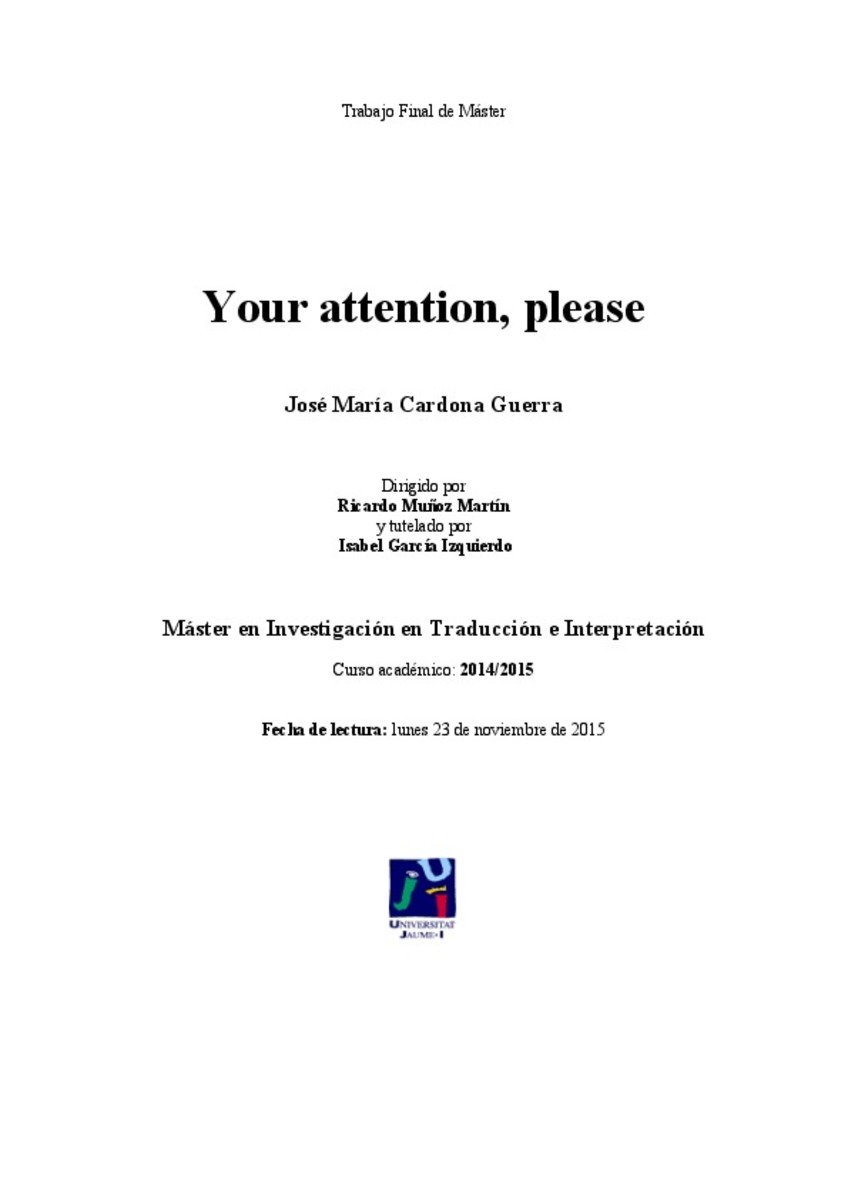Mostrar el registro sencillo del ítem
Your attention, please
| dc.contributor | García Izquierdo, Isabel | |
| dc.contributor | Muñoz Martín, Ricardo | |
| dc.contributor.author | Cardona Guerra, José María | |
| dc.contributor.other | Universitat Jaume I. Departament de Traducció i Comunicació | |
| dc.date.accessioned | 2016-01-19T10:29:14Z | |
| dc.date.available | 2016-01-19T10:29:14Z | |
| dc.date.issued | 2015-11-23 | |
| dc.identifier.uri | http://hdl.handle.net/10234/145546 | |
| dc.description | Treball Final de Màster Universitari en Investigació en Traducció i Interpretació (Pla de 2013). Codi: SBK013. Curs acadèmic 2014-2015 | ca_CA |
| dc.description.abstract | The aim of this MA final paper is to provide a summary of the state of the art of research within cognitive approaches to the translation and interpreting processes that focus on memory and attention. Many current approaches to translation and interpreting still adopt the Information-Processing Paradigm that, since the 1950s, portrays the mind as an isolated and compact software package to manipulate stored data and to combine them with new information collected through the senses. Traditional cognitive approaches to Translation and Interpreting (and therefore also the Cognitive Research of such tasks) have mainly hinged upon memory, because it is metaphorically conceived of as a massive data store and such view perfectly suits the computational model. This paper sketches some challenges and objections to the IPP model and suggests a switch of focus in order to underscore the role of attentional mechanisms in translation and interpreting. To do so, research carried out on memory and attention is reviewed and compared, both in monolinguals and in bilinguals. Finally, an overview is offered of the cognitive approaches on memory and attention in translation and interpreting. | ca_CA |
| dc.description.abstract | Este Trabajo de Fin de Máster presenta el estado de la cuestión en la investigación cognitiva del proceso de traducción e interpretación relativa a memoria y atención. Muchas investigaciones están aún bajo el influjo del paradigma del procesamiento de la información que, desde los años 50, ha contemplado la mente como un programa informático compacto y aislado que gestiona datos almacenados y los combina con información que obtiene por medio de los sentidos. Los enfoques cognitivos tradicionales en traducción e interpretación—y, en consecuencia, la investigación sobre los procesos cognitivos— se ha apoyado mucho en la memoria, pues su concepción metafórica como un enorme almacén de datos se ajusta perfectamente al modelo computacional. Este Trabajo de Fin de Máster esboza algunas objeciones al paradigma computacional y propone un cambio de enfoque que confiere mayor importancia a los mecanismos de atención al traducir o interpretar. Para ello, se resumen y comparan estudios que han abordado la memoria y los mecanismos de atención, tanto en monolingües como (después) en bilingües. Finalmente, se ofrece un panorama de los enfoques cognitivos sobre la memoria y la atención en traducción e interpretación. | ca_CA |
| dc.format.extent | 53 p. | ca_CA |
| dc.format.mimetype | application/pdf | ca_CA |
| dc.language.iso | eng | ca_CA |
| dc.publisher | Universitat Jaume I | ca_CA |
| dc.rights | Attribution-NonCommercial-ShareAlike 4.0 Spain | * |
| dc.rights.uri | http://creativecommons.org/licenses/by-nc-sa/4.0/ | * |
| dc.subject | Màster Universitari en Investigació en Traducció i Intrepretació | ca_CA |
| dc.subject | Máster en Investigación en Traducción e Interpretación | ca_CA |
| dc.subject | Master's Degree in Translation and Interpreting Research | ca_CA |
| dc.subject | attention | ca_CA |
| dc.subject | memory | ca_CA |
| dc.subject | cognition | ca_CA |
| dc.subject | translation and interpreting | ca_CA |
| dc.subject | atención | ca_CA |
| dc.subject | memoria | ca_CA |
| dc.subject | cognición | ca_CA |
| dc.subject | traducción e interpretación | ca_CA |
| dc.title | Your attention, please | ca_CA |
| dc.type | info:eu-repo/semantics/masterThesis | ca_CA |
| dc.educationLevel | Estudios de Postgrado | ca_CA |
| dc.rights.accessRights | info:eu-repo/semantics/openAccess | ca_CA |








